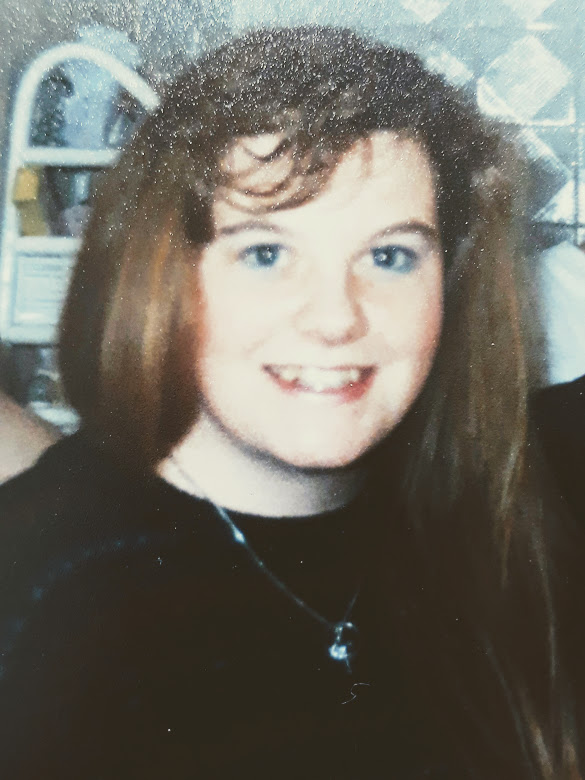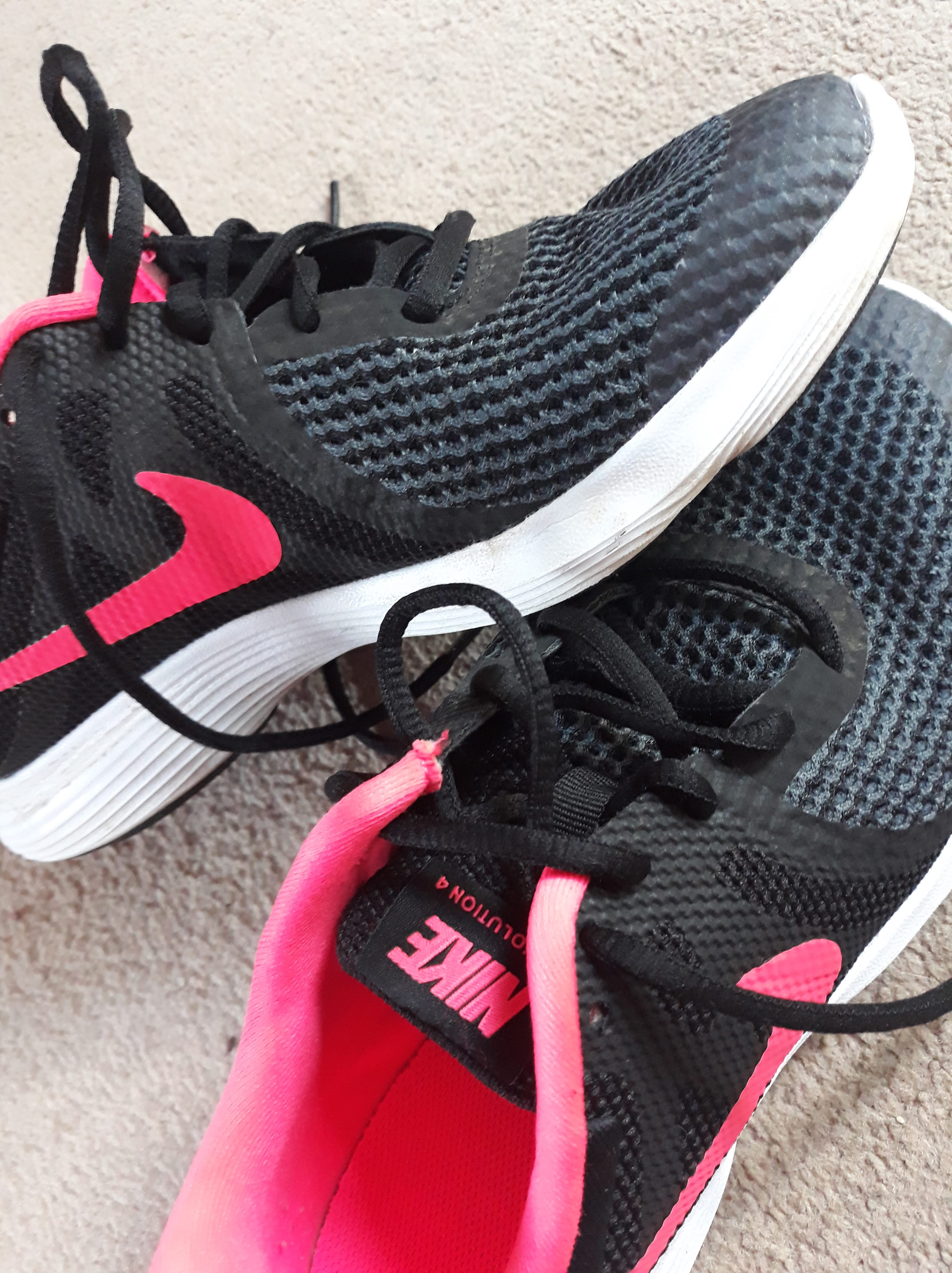
I arrive at the shops and park up. As I reach the door of the post office, I notice a handwritten sign
taped to the glass, “Post Office Counter CLOSED – just for today”. Damn. I returned to the car and throw the parcels on the passenger seat, I’ll have to come back tomorrow. As I start the car, I see her. An elderly woman with a chunky knit cream cardigan and a pink coat, holding two bags of shopping from the convenience store. She’s standing at the entrance to the alleyway between the shops, slowly looking around. Turning the car engine off again, I watch her for a moment, wondering if she is lost or confused.
Taking off my seatbelt, I step out of the car, and slowly approached her.
“Hello…..are you all right?” I ask her, tentatively, trying to find the midway point between concerned and patronising. She has thick white hair, parted to the side and neatly brushed. Under her coat and cardigan, I notice she is also wearing a sweater, despite the hot August sun.
“My son is meant to be taking me ‘ome, but he’s taken the dogs and gone. He knows I can’t walk ‘ome without my walker!….” She looks around again. I begin to look around too, not that I know who we are looking for. I ask if I can perhaps call him for her. “Well, you could – I have his number on my phone, but I’ve left it at ‘ome!” she replies, tapping her empty coat pocket.
At this point, she leans on the wall for support. I want to take the bags from her, but am focussed on her not feeling threatened. I realise I can’t just leave her, and began to consider my options.
“I could give you a lift….”
“Oh you are kind – I don’t want to put you out!”
I cannot leave her now at all, it is beginning to appear clear she is actually stranded. “It’s no problem,” I tell her, “My car is just there, and I only live on the next estate.”
We both look around again, once more hopeful perhaps, we might spot her son, or discover an alternative solution. She’s elderly and vulnerable, and I’m a stranger – I don’t want anyone to make assumptions. “I’m a teacher, I’m a safe person” I say, sheepishly, as it sounded better in my head. The woman laughs, “I don’t care if you chop me up, I need a lift!” I feel embarrassed, not on familiar enough terms with her for such a dark joke. I blurt out, weakly “Oh no, no, I’m not going to do that!”
“Well, you really are very kind!” she replies, looking at me earnestly now. “Do you know, I know everyone in all these shops and no one’s offered to help me….”
I smile at the compliment. “If you let me take your shopping, I can put it in the back of the car, and then help you in…” She offers the bags to me, but she has been holding them so long, her thin hands are now stiffly gripping the handles. Carefully, I prise the plastic bags from her tightly curled fingers, blue veins visible through her tracing-paper-like skin on her wizened hands.
The woman reaches for my spare arm and we slowly cross the concrete together, towards my car. As we reach the edge of the carpark, she stops at the top of the two steps and looks at me directly. “I’m 93, you know!” she exclaims, with pride. I comment on how well she is doing for her age, as she holds my shoulders with both hands for support before climbing shakily down the two steps.
“I’m Gwendolyn – Gwen. Who are you?” I open the car door for her and say “Judith. I’m Judith, it’s a stupid name….”
Gwen replied “Judith! No, it’s nice, it’s not stupid. Now…. “ She pauses, thinking for a moment. “Shall I go into the shop and tell them you’re giving me a lift home, in case Jim comes back for me? They know me in there.”
Realising she needed a lot of support to walk, and anxious about helping her back up the two steps again, I suggest instead I help her into the car, buckle up her her seatbelt, and then go in myself and explain to the staff in the convenience store. Gwen nods in agreement, likely relieved that she doesn’t have to walk back up the steps. Once she’s safely in the car, I shut the car door and run into the shop. There is a queue; it’s hot outside in the mid-morning sun. I think of Gwendolyn alone in the warm car, with all her layers of clothes, her coat, and the windows up. I ask if I might jump the queue to speak to the shop owner, and the man at the front kindly waves me on ahead.
“Hi, it’s just, I have an old woman in my car, Gwen, she’s – “
“Oh yeah, Gwen. Pink coat? Yeah, we know her.”
I explain that her son might come looking for her, but that I’m giving her a lift home. The shop staff agree to pass on the message should the need arise.
I race back to the car and find Gwendolyn holding a spherical glass perfume bottle from the drinks holders in the middle of the car. She’s turning it in her hands, looking intrigued. I immediately apologise for the mess in the car, mildly embarrassed, and aware I wasn’t expecting a passenger.
“I’m just having a nosey at your bits……” she answers, and having figured out it is a perfume bottle, she smells the dispenser. “Mmm, that’s nice, isn’t it?”
“It’s Carolina Herrera” I tell her, unsure if that means anything to her.
“Ooooh!” replies Gwen, her clear blue eyes sparkling excitedly, like a small girl.
At this point, I remember that I am not actually very good with elderly people. Young children are my forte, not older adults. Yet, here I am, enjoying this happenstance meeting with a legend in her nineties. I put on my seatbelt and we leave the carpark.
“My son, Jim, he’s a loner, you know? He has a flat and lives by himself. He had a girlfriend once. Head over heels for ‘er, he was…. After that, he just never found anyone else…. I wish he would,” she said, feigning annoyance, “He spends more time at my flat more than his own!”
Gwendolyn chatters as she guides me through the estate to her block of flats, “Here,” she says, pointing helpfully, “On the left. It’s this white one, just here”, gesturing to the building. Then, as if realising she’s still holding the small bottle of perfume, she reaches to put it back in the drinks holder.
“Have it! Take it, Gwendolyn! It’s my 20th wedding anniversary today, so take it as my present to you! Please, I have more at home!”
Gwen looks at me in surprise “No! Are you sure?… You are kind, you are a good Girl Guide….I used to be in the Rangers you know!”
I laugh, unclipping her seatbelt, before walking around to open her car door. I offer to hold the pink glass bottle she’s now clutching so I can help her out of the car. But she pulls her hand out of reach, “It’s my pressy from you,” she says, defiantly, “I’m keeping it safe!” With that, she pops the perfume in her coat pocket, smiling, before reaching both hands up for me to help her out of the car.
As she carefully puts her feet on the pavement, she says “I have to mind my sore leg.” I suddenly notice a terrible open ulcer on her left leg. It looks like a deep, very painful hole. I gasp in sympathy, asking if she has it dressed and bandaged at the doctor’s.
“Do I ‘eck?!” Gwen snapped. “The nurse comes, twice a day. And, do you know what she says? ‘Can I make you a cup of tea? Or a sandwich?’….That’s it.” Gwen shakes her head in displeasure, and I can’t help but think she might not be the easiest of patients.
I help her up the path, before carrying the shopping bags to the door of the apartment building. Seemingly enjoying the company, Gwendolyn begins to tell me about all her neighbours, pointing at the various houses and flats around the square explaining who lives where.
“They’re always rowing,” she gestures across the driveway. “And ‘im over there, he’s a policeman. Now those three houses, they are all foreign who live there, but they speak some English, and they are kind, you know, they always say hello…. It’s not the foreigners that are the trouble. It’s the English!” I nodded emphatically, uncertain I should take this conversation about people for whom English is an additional language any further, while equally quite relieved that Gwen clearly had some fairly well-balanced social views, for a nonagenarian.
“Over there, she’s got a few kids. He left her for about two years and then just came back, one day! She had barely fell with the youngest when he left. And now he’s back and he says ‘Look at my beautiful baby’. Hmph. He wasn’t even here when that little one was born. I says to ‘er ‘Don’t you want to get rid of ‘im?’ but she doesn’t. I’d kill ‘im, if it were me! That’s his stupid lorry, or van – van thing, or whatever…..” She points to a blue van under the trees. It’s hard to tell if Gwen’s anger is all directed at the neighbour’s husband, or if she’s projecting now. I wonder whether perhaps her discontent is vaguely for someone who had wronged her in a similar way in years gone by.
“Them two trees, they were about this big when I moved in ‘ere….now I keep asking them to cut them down, they’re too big! My Jim says it’s because I like to see what’s going on!” and she laughs, enjoying the fact he called her out on her real reason for disliking the all the green foliage. Again, her eyes take on that child-like gleam for a moment or two.
I take a breath and try to finish our chat. “Well, Gwen, let’s get you in, as I’m off to the gym now,” pointing to my gym clothes and running shoes. My original plan, which seemed to have been devised days ago now, was post office, then gym.
“Oh don’t go to the gym. No…just go ‘ome, lie on your back….and do some circles with your legs…” we both laugh together at the amusing vision of it, or at Gwen’s attempt to give me fitness advice, I’m not sure which.
“Do you know,” she continues, “some mornings, I wake up, I make my cup of tea, and I think to myself, cereal or toast? Then I just eat half a pack of biscuits instead! I do! My daughter knows, she buys me about 5 packs of Rich Tea biscuits a week!” Her little-girl eyes light up again, relishing the naughtiness of simply eating biscuits for breakfast. Because she can. I laugh, shaking my head. “Well, it saves you washing up, Gwen, because you can eat them straight from the packet!” She laughs, too.
Realising I’ve been gone a while, and it’s hot, I make another attempt to wrap things up with Gwen. “I best get back and see how much mess the children have made in the house,” I tell her, rolling my eyes, dramatically.
“How many have you got?” she asks me.
“Three; girls of 15 and 17, and my boy is 18.”
Gwen looks off into the distance, and speaks quietly now, almost as though I’m no longer there to listen. “I can’t remember how many children I’ve got,” she mutters vaguely, appearing preoccupied. “A boy….he died. So, Jim… one, two, three, four….five. Five.” She announces the “Five” in her normal volume, resuming eye contact with me, having counted on her fingers. “And grandchildren.”
“Five kids! Did they mess your house up?” I ask her, genuinely curious.
Gwen shakes her head, “No, I’d just say ‘I’m going out for lunch, this house better be spotless when I get back! Or ELSE!’….” She wags her finger, repeating “Or ELSE! You’ve got to be strict!” But then she smiles, her face softening, as though there never really was an ‘else’, and it was always just an empty threat.
I feel like I could listen to her all day, and am honestly surprised how much I am enjoying our chat, considering I normally feel a faint impatience with older people. I would say with “people Gwen’s age” rather than older people, but I am aware I don’t even know anyone else as old as Gwendolyn.
I pick up her shopping bags, and she tells me to push the door and go on through. I try holding the door behind me for her with my free arm, but it’s heavy, and my arm is at a bad angle. “Go. Go on!” says Gwen, “I’m okay!”
“I don’t want the door to squash you!” I tell my new friend, with a giggle. But then I realise, she’s home, and this is her door, and she is more than capable of managing it. All four foot ten of her.
Behind me now, Gwen tells me to push the door on the right, number 4. “It’s unlocked, it’s always unlocked” she says. I push the door ajar and hear dogs rousing and barking, and a man’s voice telling them to ‘shush’ which stops me in my tracks.
“Oh, that’s my Jim” she says, as I look to her for reassurance, “it’s ok, the dogs won’t ‘urt you.” The door opens fully, and there is a man in his late 50s standing there. Gwen walks past me into the flat, as the dogs sniff around my shoes. “This lady gave me a lift ‘ome” explained Gwen. Jim takes the shopping bags and thanks me, before turning to Gwen “I thought you were gonna call me to come get ya, but you didn’t have your phone!”
I felt a slight wave of annoyance towards Jim, as he didn’t seem to have thought through how she would get home when he left her at the shops. Now it seems he had noticed her phone was in the flat, too. The television is on loud, and I remember there was an important (“important”) football match on this morning. Perhaps that explains his rush to abandon his elderly mother, and get back to the TV.
“Do you want to stay for coffee?” asks Gwen.
“Thank you, no, I must get back. It was lovely to meet you!” I truly meant it. What a serendipitous honour to have spent an hour with such an amazing woman who had lived two of my lives.
Gwendolyn replied she was pleased to meet me too, and invited me to drop in sometime, “now you know where I live! Number 4!” I laugh and say I will look out for her at the shops in future.
When I arrive back home, our teenagers ask if I was okay, aware I had been out for a while. Delightedly, I them all about Gwendolyn, and recount our wonderful conversations. We all laugh gently at her funny stories. Our middle daughter sits quietly as she listens to me sharing the events of the morning. Eventually, she announces “That’s your Guardian Angel.” We are not a religious family, and her comment takes me by surprise. “What do you mean?” I ask.
“Think about it. You’ve been married 20 years today, and how many times do you have an experience like that where you meet a lovely old lady? You’re always at those shops, why would that just happen today? Maybe it’s someone trying to wish you a lovely day.”
I sit with her words falling around me. I think fondly of my own grandmother who died only months after our wedding, 20 years ago. She had loved looking at our wedding photos, over and over in her hospital bed during her final weeks. She told everyone who would listen that our wedding was the best day of her life. She wasn’t unlike Gwendolyn in her feistiness, cheekiness and wit. They also shared a determination to keep going, whatever life threw their way. And a sneaky sweet tooth, along with a little-girl twinkle in their eyes.
If my daughter is right, then thanks, Nana. Thank you for the joy you sent me today by way of the marvellous little force that is Gwendolyn at number 4. Thank you for that special 20th anniversary gift.














